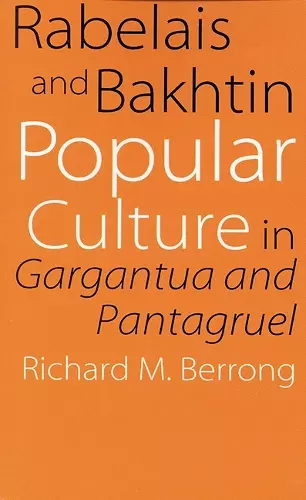Rabelais and Bakhtin
Popular Culture in "Gargantua and Pantagruel"
Format:Paperback
Publisher:University of Nebraska Press
Published:1st Mar '06
Currently unavailable, and unfortunately no date known when it will be back

An examination of the historical and textual weaknesses of Mikhail Bakhtin's argument that the key to Rabelais's narratives was to be found in their language of popular culture
Demonstrates both the historical and textual weaknesses of the argument advanced by Mikhail Bakhtin and his influential study "Rabelais and His World". This book demonstrates the complex and shifting role of popular culture in Rabelais' narratives.In Rabelais and Bakhtin, Richard M. Berrong demonstrates both the historical and textual weaknesses of the argument advanced by Mikhail Bakhtin and his influential study Rabelais and His World. The publication of Bakhtin's book in the West in the late 1960s brought both Rabelais and Bakhtin to the attention of students interested in the "New Criticism" in literature. Bakhtin agrued that the key to Rabelais's narratives was to be found in their language of popular culture, which was intended to free his readers from the ideological "prison house" of official, establishment discourse; to provide them with a nonofficial perspective from which to view—and combat—the establishment and its institutions.
Since the publication of Bakhtin's study, scholars such as Peter Burke, Natalie Zemon Davis, and Carlo Ginzburg have shown that the relationship of the upper classes to popular culture changed in the first half of the sixteenth century. Previously these classes had participated fully in the culture of the people (while adhering to their own), but at that time they undertook to exclude popular culture from their lives and from their world.
In his refutation of Bakhtin's thesis, Berrong demonstrates the complex and shifting role of popular culture in Rabelais's narratives. His conclusions should interest not only readers of Gargantua and Pantagruel but all students of the sixteenth century, since the use and exclusion of popular culture is an issue in the study of many of the writers, artists, and composers of the period.
"Berrong's systematic refutation of Bakhtin's Rabelais and His World is welcome. Its timing and relevance are perfect. What he says had to be said. It cleans the atmosphere, eliminates wrong ideas, puts Rabelais in a proper perspective, and addresses questions of grat importance for our understanding not only of Rabelais, but of sixteenth-century literature as well."—Gérard Defaux, Johns Hopkins University.
ISBN: 9780803262614
Dimensions: unknown
Weight: 204g
156 pages